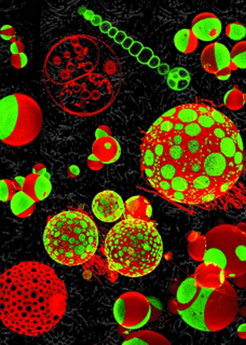
Press Page Petra Schwille
The ABCs of Life
How did the first cells arise billions of years ago? And which features and capabilities did they have? Petra Schwille and her research department want to start from scratch and create a biological system from individual building blocks which is able to self-replicate – an ancestor of all cells.

The first cells on earth must have originated from simple ‘building blocks’. They represent an important step in evolution which is still not understood and which the scientists want to elucidate by constructing an artificial cell. At present, however, even a minimal cell is too complex to reconstruct. Therefore, the scientists have to assemble smaller biological modules first. Schwille’s research activities focus on biological membranes, which consist of many proteins and lipids. They form the boundary of the cell and are involved in many cellular processes.
Technical toolkits
In order to understand elementary processes in greater detail, the biophysicist develops her own methods for their investigation. She and her team pioneered the development and application of a biophysical method, Fluorescence Cross Correlation Spectroscopy (FCCS), and other single molecule methods such that these can now also be used for biological research. In this way, the density and dynamics of individual cellular molecules can be determined with unprecedented precision.
Eyes on evolution
Schwille has already succeeded in combining a model membrane system with other active components. From an artificial cell membrane, two bacterial proteins and the energy source ATP, she and her team have developed a minimal biological system that is capable of self-organization. However, in spite of initial success and methodological progress, the artificial cell is not yet within reach: In the foreseeable future cells will probably continue to be derived from other cells.



